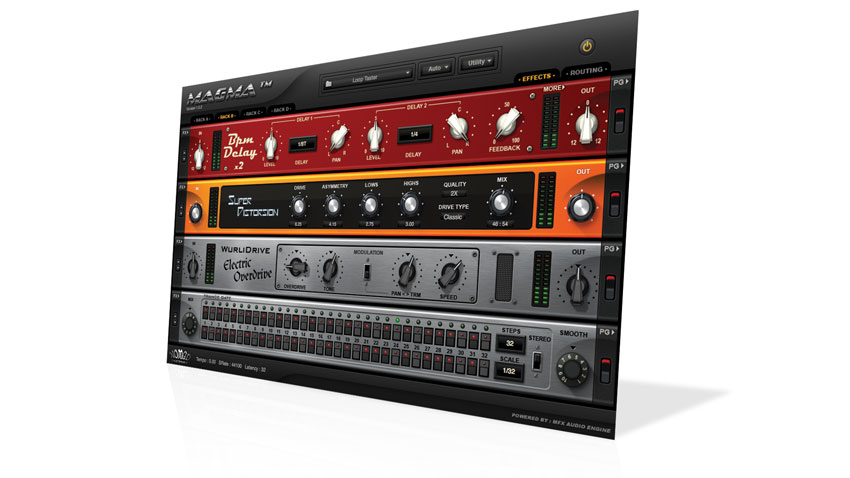MusicRadar Verdict
A flexible, easy-to-use effects suite that sacrifices a certain amount of depth in favour of breadth.
Pros
- +
Comprehensive one-stop shop. CPU-friendly. Great preset collection. Jack of all trades...
Cons
- -
...But master of none. No preset stepping or A/B comparison. Automation currently messy in Pro Tools.
MusicRadar's got your back
The idea of the self-contained virtual effects rack isn't a new one, but it's not every day that a new take on the concept comes along. Nomad Factory's new Magma gives you a monster rack, with 65 diverse modules covering pretty much all processing eventualities, all housed within a single 32-/64-bit VST/AU/RTAS DAW plug-in.
The plug-in actually comprises four separate racks (each with four effects slots) plus a routing window that enables them to be run in one of six serial and parallel permutations.
The effects are grouped into Amps, Analysis, Cabs, Delays, Distortions, Dynamics, EQs, Filters, Generators, Harmonics, Modulations, Reverbs, Special Effects and Utilities. (A full list of all the included effects is available on the Nomad Factory website.) Stars of the show include the Distortions, Modulations and Reverbs groups.
"The reverbs are the biggest surprise, considering the specialist nature of the effect"
The seven distortion effects cover the whole range of overdrives, from Fat and Super through to the warmer Wurli-Drive. There is a generic sound to them, particularly regarding low-end distortion, but the controls are varied enough to give each one plenty of individual character.
The reverbs are the biggest surprise, considering the specialist nature of the effect. Purple Verb is a huge ambient space, the high quality of which belies its modest CPU toll, while Plate is particularly accurate and colourful. At the other end of the quality scale, Spring doesn't really sound like one, and Studio Room has the typical harsh resonances of an economy reverb.
The Modulation group is made up of phasers, flangers, chorus, auto-pan, tremolo and vibrato, so you're not short on choice, and the emphasis again is on character rather than fidelity.
Anything missing? Not much. There's no wah- style envelope follower, although the synced Tremolo provides good rhythmic filtering. And the choice of amps is er... one, and that's an American-style fizzy lead model, so some more ballsy heads would be good. Otherwise, it really is a very handy arsenal of effects.
Want all the hottest music and gear news, reviews, deals, features and more, direct to your inbox? Sign up here.
Method in the Magma
Magma is incredibly easy to use, and it also presents a very familiar processing environment for the experienced engineer. The presets are impressive in terms of range and organisation, and the CPU usage is pleasantly surprising: it barely tickles the meter, even with two or three filled racks running.
The automation setup claims to present all parameters of all racked effects to the host, but our experience of this in Pro Tools wasn't ideal. The 100 parameters appear as numbers, not labels, so there's no way of knowing what's what.
"On value for money and sheer convenience, it's hard to beat the all-encompassing Magma"
The various routing permutations are good, but there's currently no facility for sidechaining external signals, or for more wayward feedback patching (like you can do 'round the back' of Reason). Both of these would be very welcome.
On value for money and sheer convenience, it's hard to beat the all-encompassing Magma. Pretty much every effect you're ever going to need is there, and the well-stocked preset library makes it a complete one-stop shop, particularly for the beginner who might not yet be up to the task of building effects chains from scratch.
On the down side, it's very much a jack-of-all-trades and thus carries quite a few limitations, but as a comprehensive, easy-to-use effects rack, it covers all bases and sounds good.
Computer Music magazine is the world’s best selling publication dedicated solely to making great music with your Mac or PC computer. Each issue it brings its lucky readers the best in cutting-edge tutorials, need-to-know, expert software reviews and even all the tools you actually need to make great music today, courtesy of our legendary CM Plugin Suite.

